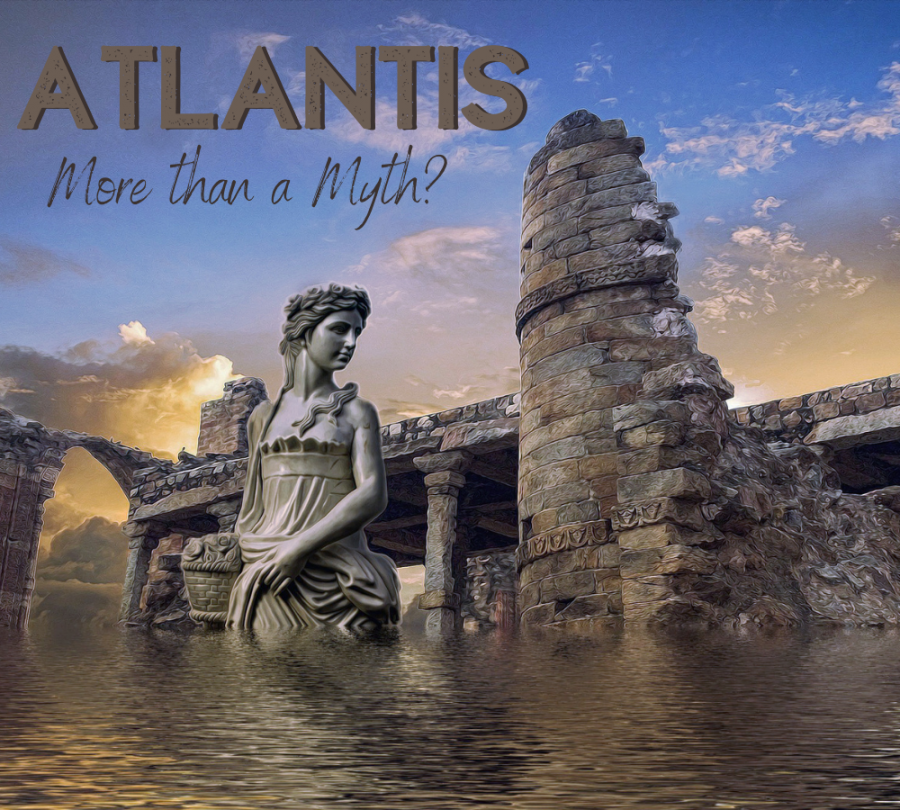In Plato’s Timaeus and Critias dialogues, the eminent Greek philosopher describes a lost city-state, a utopian island-society sunk irretrievably beneath the sea. Plato depicts a flourishing city attempting globalization, a high-tech civilization, that “ceased to wear its prosperity with moderation,” and thus the gods struck it down. Long after Plato’s first account of this republic-gone-awry, the Lost City of Atlantis now haunts contemporary culture from its watery grave, both aesthetically and philosophically. Society, on the verge of tumbling into perhaps cataclysmic singularity-level technology, might still find much to learn from this ancient tale.
Biblical stories, alongside its Greek counterpart with Deucalion and the elaboration of The Book of Enoch, interpenetrates the Atlantis myth. The Book of Enoch describes the invasion of rebel angels into the human domain. Looking with lust at the “daughters of men,” Azazel, Gadreel, Samyaza, and other rebellious “Watchers” descended from their rightful estate and into the realm of mankind. They taught the humans metalworking, astrology, herbology, and a slew of other “lesser mysteries” from the heavens. Giants, the mythic nephilim, roamed causing immense bloodshed and seeding the Jewish kherem (conquest and slaughter) of neighboring nations. These fallen angels were later dubbed the “Archons” by Christian Gnostics, vampiric forces entrapping souls in the “corrupted” material realm. And outlined here seems an unwanted (unwanted from Yahweh/Zeus’s perspective) and unnatural blurring of the divide between Heaven and Earth, Asgard and Midgard, and the frenzied catastrophes that result from this deconstruction. However, the myth of Atlantis tells a different, perhaps more redemptive, story.
Plato, oddly enough, claimed that he inherited the story of Atlantis, rather than dreamt it. Solon, the famed Athenian lawmaker and ancestor of Plato, penned a manuscript concerning this lost city, which he asserted was a product of his visit to Egypt. There, Egyptian priests told him a story “written on the temple walls” of a lost civilization sunk beneath the sea 9,000 years before his time. “Atlantis” translates into “Realm of Atlas”–both in the sense of the original king of Atlantis, son of Poseidon, as well as the primeval titan, upon whose back the vault of the stars rests above the Earth. In this sense, Atlantis stood as the spectral union of Heaven and Earth, Atlas himself; and that same specter haunts contemporary culture, just as it haunted the ancients, and just as it haunted European thought all the way into the Enlightenment.
Francis Bacon (1561-1626), in his incomplete novel The New Atlantis, puts his own spin on Plato’s lost utopia. Bacon, heralded as a founding father of the Enlightenment and the scientific method, attempted to outline a coming super-society, a secluded and techno-scientific breakaway civilization. This vision portrays an eerie prophecy of coming technology–refrigeration, skyscrapers, telecommunications, and even laser beams. “Masters of illusion” rule this island in the Pacific, Bensalem, weaving a hyperreal web that might appear “magical” to those uninitiated. Bacon heralded a rebirth of Atlantis in the European psyche, working from Plato’s mold, and projecting out a lost future towards which the new “rational” and “enlightened” Europe could aspire. However Rudolf Steiner, a German philosopher and proclaimed psychic, disregarded Bacon’s iteration, choosing instead to delve into the watery abyss behind history and excavate what really happened at so-called Atlantis.
The German Steiner claimed that the true inhabitants of Atlantis lived as beings who had descended from the “heavenly spheres” and into the earthly realm. Not entirely corporeal, these entities returned to their spiritual lodgings in sleep, performing their duties therein, before awakening to “rest” inside material bodies. The nature of the Atlanteans, Steiner claims, allowed them to exert tremendous psychical manipulation over matter. Psychokinetic technologies, a telepathic hive-mind, inhuman memory capacity, a wholly visionary rationale and communication–all the everyday existence of the Atlanteans. Steiner supposedly remote-viewed into the past to observe the goings-on of Atlantis and built his account from these visions, certainly a method divergent from Bacon’s deliberations. But congruous with Plato, Steiner corroborates the idea of a destructive flood–and rather than the wrath of a Zeus or a Yahweh, Nature’s backlash from the misuse of parapsychology capsized the Atlantean hierarchy. The homeless scholars and psychics, fallen angels, they boarded rafts and traveled to Egypt, to Mesoamerica, to Sumer, and taught these lowly populations their lesser secrets, in turn becoming the “gods” of those respective pantheons. “Odin,” “Osiris,” “Enki,” “Quetzalcoatl”–many names for these wayward vagabonds, disturbingly echoing the account of The Book of Enoch.
One fellow German, obsessed with the occult and taking note of the Theosophical resurgence of Atlantean speculation, decided to seek out the lost city in hopes of finding the genesis of his imaginary “master race.” Adolph Hitler, in order to fan the mythos of his Aryan ideal, framed Atlantis as the lost site of his race’s origin. Sending squadrons on expeditions to Tibet and even Antarctica, Hitler, Heinrich Himmler, and others hoped to find a remote Aryan seed in whatever mythos or mystical system they admired. And similar to the wicked Azazel, Gadreel, and Samyaza, they found only men steeped in their own traditions and culture. Here, history tries desperately to repeat itself–when the heroes are bathed in the waters of Lethe, forgetfulness, only monsters will strive to remember. When the past haunts, possessing the unconscious, the vault between Heaven and Earth dissolves before the monolithic spectral, and catastrophe becomes ineluctable. Because, in accordance with recent archeological and geological research, the idea of a lost civilization descends further and further from the space of simple superstition.
The destruction of Plato’s Atlantis, as written by Solon, occurred approximately 11,600 years ago. This time frame, astonishingly, coincides precisely with meltwater pulse 1B: a truly catastrophic episode in geological history, wherein the ice sheets of North America and Europe crumbled and collapsed into the Ocean. This meltdown catapulted sea levels, meaning any coastal or low island life surely fell beneath the tides. With this new revelation, Plato’s fairy tale assumes a new gravity and a new terror. Atlantis, as one of the only mythical substructures explicitly utilized by philosophers, was perhaps remembered for good reason. The message: that man, despite his Promethean yearnings and constructed contexts, still rests firmly embedded in the matrix of Nature. And as society sprints towards Bacon’s phantasmagoria, true in spirit to the Atlantean impulse, it must take care to understand human limitations–human horizons–lest the vault of the heavens disintegrate prematurely, the Archons fly free from Tartarus, and humanity face the spectrality of all existence. A daimon transforms into a demon only when allowed to work in the dark and in amnesia–better promethea than epimethea, better forethought drawing upon the well of the past, than an afterthought beyond tragedy.


